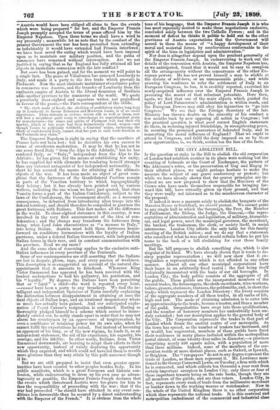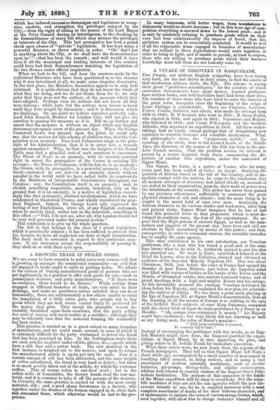THE CITY ABOLITION BILL. -
IF the question at stake in the Bill to abolish the old corporation of Lonclon4ind establish another in its place were nothing but the counting of hobnails at the Court of Exchequer, the pattern of the Alderman's robes, or the preservation of Gog and Magog in their allotted places, we might perhaps hesitate to make the measure the subject of any grave controversy or protest ; but while we have already shown that far graver principles are in- volved we are now prepared to show that the Ministers of the Crown who have made themselves responsible for- bringing for- ward this bill, have virtually given up their ground, and that they were really not informed as to the mischievous character of the proposal. If indeed it were a measure solely to abolish the banquets of the Mansion House or Guildhall, we should protest. We cannot point to any single hall in which the Sovereign, the Peer, the Member of Parliament, the Bishop, the Judge, the General,—the repre- sentatives of administration and legislation, of military, hierarchi- cal, and legal power, meet the municipal governor, the merchant, the banker, the tradesman, the clerk, or society itself, in social intercourse. London City aftbrds the only table for this family meeting of the British nation ; and we do say that a statesman who considered what he was about would refrain before he put his name to the back of a bill abolishing for ever those family meetings. But the bill proposes to abolish something else, which is also singular of its kind. We have already shown that it tends to de- stroy . popular representation ; we will now show that it ex- tinguishes a. representation which is not afforded in any other manner. Almost all our other municipal corporations have their bases in an arbitrarily fixed rental ; the fact being itself technically inconsistent with the basis of our old boroughs. In London City, the body politic consists of the aggregate of all the guilds. These guilds are the incorporated members of the several trades, the fishmongers, the cloth-merchants, wire-workers, tailors, grocers, stationers, vintners, the goldsmiths, and, in short the trades which represent the London Directory : the livery consists of the aggregate numbers of all those trades, in all ranks of life, high and low. The mode of obtaining admission is to enter into an apprenticeship to the trade, become a master, and thus a member of the guild. Irregularities have crept into these qualifications, and the number of honorary members has undoubtedly been un- duly extended ; but our description applies to the general body of the City. The Corporation represents the trades in that part of London which forms the ancient centre of our metropolis. As the town has spread, as the number of traders has-increased, and as wealth has augmented, members of these guilds have fixed their residences in many places included within the metropolitan postal circuit, of some twenty-four miles in diameter,—a province comprising nearly 450 square miles, with a population of more than three millions. Indeed, some of the members of the cor- poration reside at more distant places, such as Oxford, or Ipswich, or Brighton. The " ratepayers" do not in any degree represent the trade of London, as these men represent it. Mr. Lawrence men- tioned to Sir George Cornwall Lewis, on Tuesday, a firm with which he is connected, and which collects ten thousand a year rent from certain important occupiers in London City, only three or four of those important tenants being on the rate books, though they are all members of the guilds, and are thus voters. London City, in fact, represents every rank of trade from the millionaire merchant or banker down to the working weaver or watchmaker. Now in the whole of the United Kingdom there is no other corporation which thus represents the national trade. It is this centrical and metropolitan embodiment of the commercial and industrial class which has induced successive I3overeigns and legislators to recog- nize, confirm, and strengthen the privileges enjoyed by the City,—from the right of sitting in the person of the Lord Mayor at the Privy Council during an interregnum, to the checking by its Remembrancer of every bill which may menace the privileges or interests of the City. This last .prerogative has been a grand check upon abuses of " private " legislation. It has kept many a powerful Minister, or clever official, in order. " Oh T. don't put
in anything about City, or we shall have the Remembrancer upon us !"—that has been the remark ; and well would it have been if all the municipal and trading interests of this country could have had their Remembrancer watching the legislation of the two Houses under official inspiration. When we look to the bill, and hear the answers made by the individual Ministers who have been questioned as to the reasons why it was introduced at all, we make some singular discoveries. In the first place, the Ministers themselves appear to be only half informed. It is quite obvious that they do not know the whole of what they are doing, and we do not blame them for it ; we only infer that they were not the authors of the measure which they have adopted. Perhaps even its authors did not know all they were risking; while none but the authors were bound to know until they were taught by discussion ; and it is discussion which we challenge. On one point we believe ourselves perfectly safe ; Lord John Russell, Member for London City, will not give his sanction to passing the measure as it is. But we go further and assert that the measure is without an object which any English statesman can openly avow at the present day. When Sir George Cornewall Lewis was pressed upon the point, he could only say, that the motive for this scheme of abolition was, that the Cor- poration is an anomaly. Does Lord Palmerston adopt as the prin- ciple of his Administration that it is to enter into a crusade against anomalies ? Why, in that case the knights of his Round Table may find a plentiful rout of such monsters to encounter. The House of Peers is an anomaly, with its recently-asserted right to arrest the prerogative of the Crown in creating life peerages ; the House of Commons, with its hat on, is an anomaly ; the Crown, with its prerogative, is a powerful anomaly ; the Ca- binet—unnamed in our law—is an anomaly almost without parallel in the world until we have called forth its counterfeits in the Ministers of irresponsible Governments throughout our Colonies ; nay, the Constitution itself is an anomaly ; and, to abolish something respectable, ancient, beneficial, only on the pound that it is an anomaly, is a motive of legislation exceed- ingly like that systematic, abstract revolutionism, which we have condemned in theoretical France, and wholly repudiated for prac- tical England. Indeed, Sir George Lewis only expressed the feeling of any Englishman, above all, of any English statesman, when he naively cried, rather late in the interview, something to this effect :—" Still, I do not see, after all, why London should not be very well governed under the present system." This confession is to give up the whole question.
The bill in fact, belongs to the class of A priori legislation, which is practically aimless ; it has been suffered to proceed thus far, because we have all neglected our duty of rigid examination. The fault shall be corrected in regard to this particular mea- sure. If our statesmen accept the responsibility of passing it, they shall do so with their eyes open.



























 Previous page
Previous page